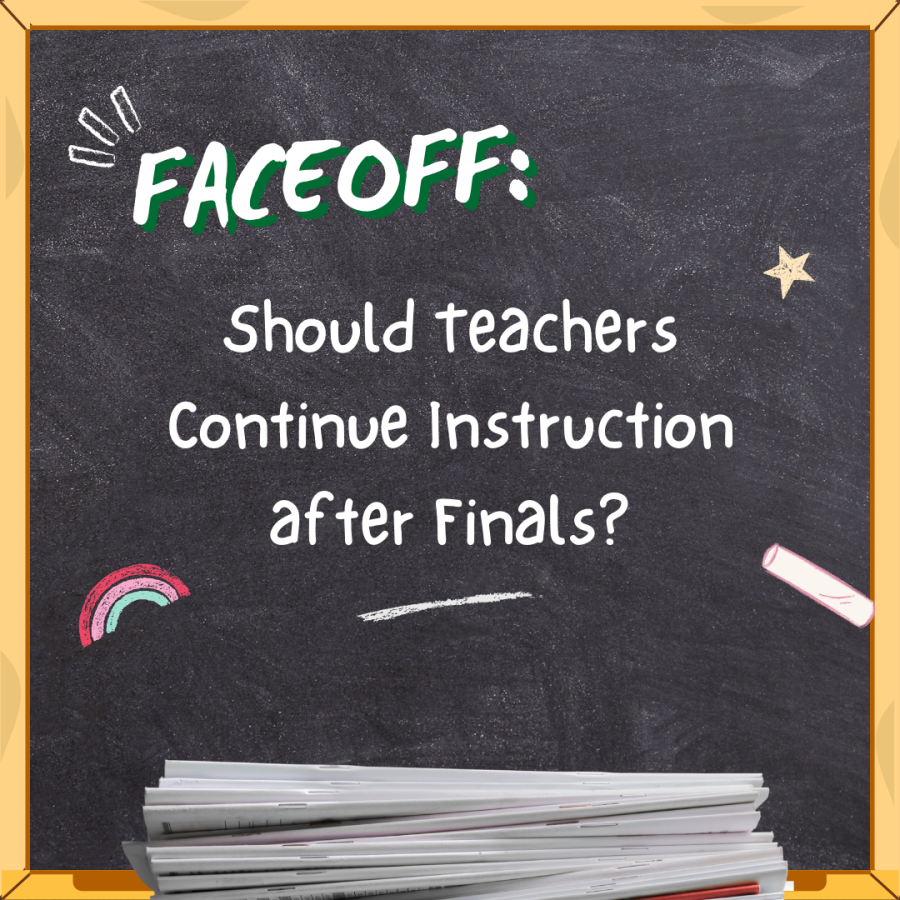FACEOFF: Should Teachers Continue Instruction after Finals?
May 21, 2022
Yes (K.M):
For most students, the months of May and June have generally spent yearning for summer vacation. The relatively brief period of time between finals and school ending needs to be used in a productive manner, and teachers should continue instruction during this final stretch.
When teachers stop instruction after end-of-year exams, attending school becomes pointless. This unproductiveness leads to excessive student (and sometimes even teacher) absences. Why should students attend school to do nothing? I completely understand feeling burned out and exhausted at the end of the school year. However, I am a firm believer that when teaching stops, this lack of motivation only worsens.
The purpose of school should be for students to learn and gain knowledge of a subject, not simply to pass a final. The claim that after final exams are done, teaching should stop reinforces the idea that learning comes second to exams. The weeks before summer are the ideal time for interesting lessons that intrigue students and help them absorb important material, as the focus is no longer placed on exams and cramming.
However, instruction after finals should be more easygoing than during the rest of the year. Grading should be increasingly flexible with tests few and far between. Nonetheless, there is a major and important difference between slowing down and doing nothing. According to the National Library of Medicine, repetition is one of the best forms of memorization. After exams, the most worthwhile use of time is to repeat lessons from the year to ensure maximum long-term retention.
According to K-12Dive’s study, more than half of students lose 39% of the year’s learning over the summer. Schools need to do whatever possible to reduce this percentage; another month without instruction is another month of forgetting class material. The end of the year needs to be spent reviewing and reinforcing information, promoting learning instead of cramming. Rather than wasting precious learning time, instruction should continue after final exams for the home stretch before summer, so that students can end school on a strong and productive note.
No (S.E.):
For about 32 weeks a year, seven days a week and eight hours a day, students spend countless hours and sleepless nights preparing for their final exams. Once the dreaded day finally passes and the last hurdle has been jumped, students want nothing more than a break. Just about four weeks remain until the summer and students feel little motivation to work on assignments. Continuing to assign worksheets, quizzes and tests may not only completely burn out normally motivated students, but it may also have irreversible effects on their grades.
Throughout the school year, discussions, group projects, research papers and homework assignments consume students’ time. Yet, thanks to standardized testing and a rigid, full curriculum, many teachers tend to focus on drilling information into students’ brains so they pass their finals. Upon completing these mentally exhausting tests — APs, EOCs and FSAs — students officially check out mentally. While most continue to attend school, many students start re-prioritizing sleep, reducing the amount of time they spend on homework and relaxing as they begin thinking about the approaching summer. Teaching after final exams may not only be mentally draining but simply inefficient because there is less incentive and motivation for students to do well after a long school year.
In no way am I advocating for students to attend classes to do nothing, but rather for teachers to spend the final 20 days in a new manner. Whether teachers play the movie that corresponds to the book they read during the year, allow students to make their own board games or assign students to help with filing, the opportunities are limitless. Teachers can also take the opportunity to catch up on grading if needed. This helps both the teacher and the student avoid stress. Therefore, students can finish off the year knowing what grade they received, and teachers can avoid the stress of entering grades just before the semester ends.
At the end of the year, continuing to teach unmotivated students is virtually pointless. The final weeks of school allow students to rest and refocus before the approaching school year. If students spend their final weeks in school engaging in other creative activities, they can head into the next year with excitement instead of dread.










